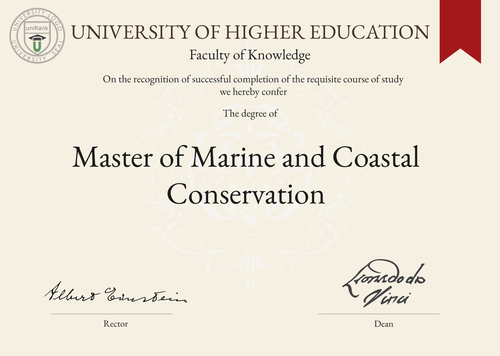
Master of Marine and Coastal Conservation (M.M.C.C.)
Guide to Master of Marine and Coastal Conservation Program/Course/Degree
Master of Marine and Coastal Conservation (M.M.C.C.)

Program Name:
Master of Marine and Coastal ConservationProgram or Degree abbreviation:
M.M.C.C.Duration range:
Varies by country and university, typically 1-2 yearsTuition range:
Varies by country and university, typically $10,000-$30,000 per yearOverview:
The Master of Marine and Coastal Conservation program is designed to provide students with a comprehensive understanding of the marine and coastal ecosystems, their conservation and sustainable management. This program equips students with the necessary knowledge and skills to address the complex challenges faced by these environments.Curriculum Overview by year:
The curriculum is structured to cover various aspects of marine and coastal conservation. In the first year, students typically study foundational courses such as marine ecology, coastal management and conservation biology. In the second year, they delve deeper into specialized areas such as marine policy, marine biodiversity and climate change impacts on coastal ecosystems.Key Components:
- Understanding marine and coastal ecosystems - Conservation strategies and techniques - Sustainable management practices - Policy and governance in marine conservation - Research methods and data analysisCareer Prospects:
Graduates of the Master of Marine and Coastal Conservation program can pursue diverse career paths. They may work as marine conservation officers, coastal zone managers, environmental consultants, research scientists, or educators. Opportunities exist in government agencies, non-profit organizations, research institutions and private sector companies.Salary Expectations:
Salary expectations for graduates vary depending on factors such as job position, location and level of experience. Entry-level positions in marine and coastal conservation typically offer salaries ranging from $40,000 to $60,000 per year. With experience and expertise, professionals can earn higher salaries, reaching up to $100,000 or more annually. For a more accurate understanding of salary expectations, you can utilize the Job Sites Search Engine, from our sister site jobRank, which searches over 4,600 job sites worldwide. Make sure to specify not only the job title but also the country you are interested in.Conclusions:
It is important to note that the duration, tuition fees, curriculum, key components, career prospects and salary expectations of the Master of Marine and Coastal Conservation program can vary based on the chosen country or location of study, as well as the specific university offering the program. Prospective students are encouraged to research and compare different universities and countries to find the best fit for their academic and career goals. Visitors interested in pursuing the Master of Marine and Coastal Conservation degree can search for universities offering this program worldwide through the uniRank World Universities Search Engine. This powerful tool allows individuals to explore various options and find the most suitable institutions to pursue their studies in marine and coastal conservation.World Universities Search Engine
search for Master of Marine and Coastal Conservation (M.M.C.C.) and add the Location (country, state etc.) or specific University you are interested in studying at.
Query examples:
- Master of Marine and Coastal Conservation (M.M.C.C.) United States
- Master of Marine and Coastal Conservation (M.M.C.C.) United Kingdom online
- Master of Marine and Coastal Conservation (M.M.C.C.) Australia international students
- Master of Marine and Coastal Conservation (M.M.C.C.) University of California
- Master of Marine and Coastal Conservation (M.M.C.C.) University of London tuition fees
- Master of Marine and Coastal Conservation (M.M.C.C.) University of Sydney scholarships
Share Program/Course
Interesting? Share this program/course/degree info with your friends now.